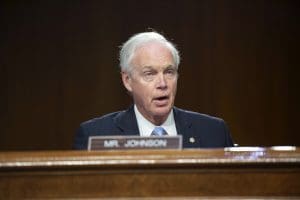Ron Johnson says he condemns white supremacy. His past actions say otherwise.
The Wisconsin Republican once said he ‘wasn’t concerned’ by the mob that stormed the Capitol on Jan. 6, 2021 — but would have been if there were ‘Black Lives Matter and Antifa protesters.’

Sen. Ron Johnson (R-WI) said in an interview on Tuesday that he condemns white supremacy. But during his two terms in the Senate, Johnson has often given credence to racist and xenophobic views while downplaying the threat posed by violent white supremacist extremists.
In an appearance on Fox Business Network, Johnson baselessly accused the Federal Bureau of Investigation and U.S. Department of Justice of politicization and attacked the agencies for not investigating Hunter Biden, President Joe Biden’s son.
He then complained that Sen. Gary Peters (D-MI), one of his Democratic colleagues on the Senate Homeland Security and Government Affairs Committee, was too focused on the threat of white supremacist violence.
“When I was chairman of Homeland Security, we would have an annual threat hearing, and my ranking member would always be bringing up white supremacy, which, you know, I condone — I mean, I condemn,” Johnson told Fox Business host Maria Bartiromo.
He then argued that “we have so many other threats facing the nation” that are more pressing.
This is not the first time Johnson has dismissed the threat of white supremacist violence in America, a concern that the U.S. Department of Homeland Security deemed a top threat while former President Donald Trump was in power.
Last month, Johnson’s Senate campaign released a racist television ad baselessly claiming that his Democratic challenger, Wisconsin Lt. Gov. Mandela Barnes, would automatically vote with a group of progressive House members of color if elected and would “eagerly join their ‘Squad.'”
The spot used grainy images of Barnes, who is Black, alongside images of Democratic lawmakers of color and immigrants. The ad concludes with a photo of Johnson standing with a grinning white man in a sheriff’s uniform in front of a pro-police “thin blue line” flag.
Last year, Johnson noted the 100th anniversary of the 1921 Tulsa massacre, where white mobs attacked and killed residents in the “Black Wall Street” neighborhood of Greenwood. While Johnson admitted the race riot was “horrible,” he dismissed the idea that racism still poses a significant problem in modern society.
“I do not believe America is a systemically racist country,” he said at the time. “I don’t think you can sit there and say things haven’t improved at all, nothing’s changed, we’re still the same hateful, systemically racist nation. We’re not. That’s a falsehood.”
In another Fox Business appearance in April 2021, Johnson espoused promoted the white supremacist “great replacement” theory, an anti-immigrant conspiracy theory that asserts that Democrats want to replace white voters with non-whites to win elections.
“This administration wants complete open borders, and you have to ask yourself why,” Johnson charged. “Is it really they want to remake the demographics of America, to ensure their — that they stay in power forever? Is that what’s happening here?”
A month earlier, he faced calls to resign after saying that he “wasn’t concerned” by the largely white violent mob of insurrectionists who stormed the Capitol on Jan. 6, 2021.
“I knew those were people who love this country, that truly respect law enforcement, would never do anything to break the law, so I wasn’t concerned,” he told conservative radio talk show host Joe Pags in March 2021.
He added: “Now, had the tables been turned — Joe, this could get me in trouble — had the tables been turned, and President Trump won the election and those were tens of thousands of Black Lives Matter and Antifa protesters, I might have been a little concerned.”
Johnson backed Donald Trump in his unsuccessful 2020 reelection campaign, despite Trump’s long history of racist comments, birther conspiracy theories, and xenophobic policies.
Even after Trump praised neo-Nazis and white nationalists who participated in the deadly Charlottesville, Virginia, rally in 2017 as “very fine people,” Johnson defended Trump by saying he gives public officials “a bit of slack in terms of not necessarily saying the perfect thing.”
Johnson alleged in a July 2015 radio interview that liberals opposed private school vouchers because “they just don’t want to let those idiot inner city kids that they purport to be so supportive of…they don’t want to give them the same opportunity their own kids have. It’s disgraceful.”
He later told the Washington Post his comments were meant to be sarcastic.
“I was being, that quote is, I’m being very sarcastic in that’s how liberals view these underprivileged kids. That is not my viewpoint in any way,” he said. “Trust me, I wish I would not have said that. That’s not what I mean.”
Johnson has also supported voter suppression laws that have been shown to unevenly restrict voting rights for people of color. The NAACP gave Johnson an “F” in its most recent civil rights scorecard based on his repeated opposition to voting rights and other key issues.
In January 2022, he falsely claimed in a radio interview that voting rights protections are no longer needed because nowadays “nobody’s suppressing the vote,” and claimed that “there’s nothing racist about voter ID.”
Voter ID laws, which have historical roots in segregation, continue to disproportionately disenfranchise poor or non-white voters.
Johnson also baselessly cast doubt on the election results in Milwaukee, a dog-whistle reference to a community with a sizeable non-white population.
“Milwaukee is a real problem,” he told Republican voters in April. “The central counting, the absentee ballots, the fact that you’ve got, you know, the largest county could not produce their results until — well, first of all — until they know exactly how many votes they need.”
Published with permission of The American Independent Foundation.
Recommended

New NC GOP chair flirts with bogus stolen election conspiracies
Simmons predecessor was a staunch 2020 election denier
By Jesse Valentine - April 19, 2024
Texas activists pushed abortion restrictions in NM cities and counties, records show
Emails reveal influence and control in exchange for promises of legal help
By Austin Fisher, Source NM - March 04, 2024
Cannabis workers across Missouri begin push to unionize dispensaries
The first day was a breeze. Sean Shannon and Danny Foster walked into several marijuana dispensaries around Missouri with their matching “Union For Cannabis Workers” shirts and talked to employees about the possibility of unionizing. “The first day, there were 57 stops amongst the teams,” said Shannon, lead organizer with UFCW Local 655, which actually […]
By Rebecca Rivas - December 04, 2023









































































